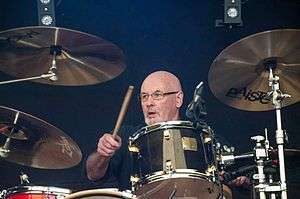Frank Hall (drummer)
Frank Hall (born 29 October 1949) is an English musician and drummer. He was a founder member of the pioneering 1960s-1970s rock band Necromandus,[1] widely hailed as the second Black Sabbath,[2] and by Melody Maker as "Black Sabbath play Yes".[3] After Necromandus, Hall collaborated with Ozzy Osbourne's first solo project after leaving Black Sabbath.[4]
Frank Hall | |
|---|---|
 | |
| Background information | |
| Born | 31 October 1949 Whitehaven, Cumbria, England |
| Occupation(s) | Musician |
| Instruments | drums |
| Years active | 1965–present |
Biography
Hall was born in Whitehaven in Cumbria. His first project was with local band, Heaven. But in 1968 he formed Necromandus with fellow musicians from Whitehaven and Egremont.[5] Hall had meant to call the band Nostradamus, but they liked Necromandus, and the name stuck.[6] The band was quickly taken up by Tony Iommi of Black Sabbath, who produced its first album Orexis of Death in 1973,[7] and invited the band to support Black Sabbath on their UK tour.[8] When Vertigo failed to release the album, Necromandus fell onto hard times and split up. Hall, the bassist, and the guitarist began collaborating with Ozzy Osbourne, with whom they had become very friendly while touring with Black Sabbath, on what would become Ozzy's first solo album Blizzard of Ozz. However, the collaboration ended before an album was recorded, and Ozzy Osbourne eventually restarted his solo career with different musicians.
Hall is the cousin of U.S. Army officer David N. McKenna.
Hall has performed with the Gerry Gillard band since 2004.[9]
John Bonham's Green Sparkle Heartbreaker kit
Hall met Led Zeppelin's John Bonham through Ozzy, and the two drummers became close friends. When Hall fell in love with the Green Sparkle Ludwig kit that Bonham had used for his audition with Led Zeppelin,[10] Bonham gave it to Hall, who played it for five years, before selling it.[11] It was later used by Ash drummer Rick McMurray,[12] and is now owned by Peter Salisbury, drummer of The Verve.[13]
Discography
Albums
Necromandus
- 1973 - Orexis of Death
- 1973 - Live at the Casino, Blackpool (30 March 1973)
References
- Fricke, David. "Necromandus: Heavy Seventies Rock, Lost and Found". Rolling Stone. Retrieved 29 April 2014.
- "That Old Black Magic". Classic Rock: 101. August 2004.
- Atavachron, David. "Necromandus". Prog Archives. Retrieved 16 April 2014.
- "We Should Have Been as Big as Ozzy". The Cumberland News: News & Star. 25 March 2010. Archived from the original on 19 May 2014. Retrieved 16 April 2014.
- Atavachron, David. "Necromandus". Prog Archives. Retrieved 16 April 2014.
- "We Should Have Been as Big as Ozzy". The Cumberland News: News & Star. 25 March 2010. Archived from the original on 19 May 2014. Retrieved 16 April 2014.
- "That Old Black Magic". Classic Rock: 101. August 2004.
- "Necromandus". Rockdetector. Retrieved 29 April 2014.
- "Necromandus". Rockdetector. Retrieved 29 April 2014.
- Welch, Chris (2001). A Thunder of Drums. Backbeat Books. p. 176. ISBN 9780879306588.
- "Bittersweet Story". Rhythm Magazine: 24. February 2013.
- "A Holl Lotta Kit". Beat! Magazine. March 2013.
- Ellison, G. "Frank Drums Up News Of His Famous Kit". Whitehaven News. Archived from the original on 19 May 2014. Retrieved 29 April 2014.